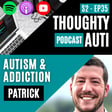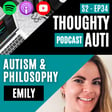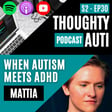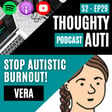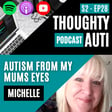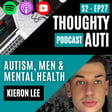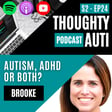
Autistic Introvert or Extrovert? - Working On Your Social Skills w/Autienelle
What is masking as an autistic person? How do autistic and neurotypical differ in communication style? How do you improve your social communication skills?
In this episode of the Thoughty Auti Podcast, Thomas talks to a librarian and Instagram spokesperson Lauren (@Autienelle) about what it means to be social on the autistic spectrum. Lauren has always been the type of person to mask at school and she tried her very best to fit in with society, it's only later in life that she realised just how much she needed her own space to be happy and has since tapered down her extroverted ventures. Thomas, on the other hand, has always been very withdrawn and quiet at school but found that with age that he enjoys being more extroverted and outgoing than he previously thought.
Are there any benefits or negatives to masking in certain situations, what things should you keep in mind when partaking in large extroverted endeavours & how do you go from being lonely and isolated... to well networked and outgoing?
There is often a hidden misconception that autistic people don't enjoy socialising or prefer to be alone; whilst we may need more space than your average joe, we are all human and interaction with other people can enrich someone's life more than you can comprehend.
Both Thomas and Lauren come from two different ends on the extroversion scale, and with that in mind, they discuss all the techniques and methods of getting that social interaction many people crave, but so often... can't find.
If you have an exciting or interesting story and want to appear on the next Podcast, please contact me at: aspergersgrowth@gmail.com
Lauren's Link:-
►https://www.instagram.com/autienelle/
▬▬▬▬▬▬▬▬▬▬▬▬▬▬▬▬▬▬▬▬▬▬▬▬▬▬▬▬▬▬▬
Channel Merchandise - https://teespring.com/stores/aspergers-growth
Support via Patreon! - https://www.patreon.com/aspergersgrowth
Social Media ♥ -
☼ Facebook - Aspergers Growth
☼ Twitter/Instagram - @aspergersgrowth
♫ Listen On -
Spotify - https://open.spotify.com/show/6vjXgCB7Q3FwtQ2YqPjnEV
Apple Podcasts - https://podcasts.apple.com/gb/podcast/thoughty-auti-the-autism-mental-health-podcast/id1470689079
Music -
♫ Track: [Chill Music] Ikson - Reverie [No Copyright Music]
Advert Track: Empty Parking Lot - Colours Of Illusion [Epidemic Sound]








